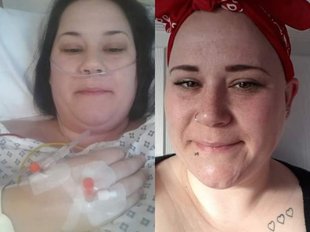Laura: My symptoms returned - I put them to the back of my mind

Laura in hospital
Laura was diagnosed with stage 3C ovarian cancer. She first shared her story with us in 2019, talking about how she had been unaware that her symptoms were associated with the disease.
Now, four years later and after experiencing symptoms again, sadly Laura is battling a recurrence. Below she reflects on her experiences to help other women at risk of the disease.
"Had I known the symptoms of ovarian cancer I might not have left it so long before going to A&E.
It all began in summer 2015, when I developed pain in my lower tummy. The pain was so bad that I had to make a visit to A&E. I also had backache, fatigue, bowel changes, abdominal pain and bloating, which are all symptoms of ovarian cancer.
Doctors told me they suspected appendicitis, and I was asked to come back the following day for an ultrasound for the diagnosis.
When I returned, they discovered two large cysts - one on each ovary. The cysts were so large that I had to undergo surgery the same day and that was that.
I thought it was all over - but three months later at an ultrasound check-up, they discovered that the cysts returned even bigger than before. I was so shocked - but the information I found out next was even worse.
Because the cysts had returned and grown so large so quickly, doctors were concerned and sent me for a biopsy. When the results came back, I was diagnosed with stage 3C ovarian cancer. My life changed forever.
I had initially thought ovarian cancer was a disease that only affected older ladies - but I was diagnosed at 29 years old.
Due to the family history of cancer, between the consultant, myself and my husband, we decided that I would undergo a full hysterectomy. The procedure went as planned and I had several sessions of chemotherapy, but I remember feeling very scared.
All I could think about was my children. I had a beautiful boy and a gorgeous girl, aged 6 and 4 at that time. I was constantly worrying about how long I would be around for them. How many more times would I tuck them in at night?
The chemotherapy was successful and I continued to have regular check-ups and was doing well for a number of years.
Laura“My symptoms returned - I put them to the back of my mind”
Earlier this year, I started to experience bloating and discomfort in my tummy, which continued to get worse. Initially, I ignored the symptoms because I had so much going on - I recently split from my husband and moved into a new property with my new partner.
Since experiencing symptoms again, I booked in with my GP who did CA125 test and an ultrasound scan. The CA125 came back elevated but the ultrasound was clear. However, as I’ve had cancer before, they decided to refer me for a CT scan.
The scan showed a likely recurrence, which was confirmed after I underwent surgery and a biopsy.
I’m feeling a bag of mixed emotions at the minute, one moment I’m feeling so positive about the future but the next I’m wondering ‘why me again’?
Tragically, the oncologist said the cancer is likely to resist the chemotherapy. He also said I can’t have any more surgery at this stage - because the cancer is cells rather than tumours. I am due to start Letrozole on Tuesday which will hopefully stop the cancer from progressing.
I’m going to have to come to terms with the thought of living with cancer, but I’m hoping I can continue to live a relatively normal life with my partner and two kids.
I want other women to know the signs of ovarian cancer to look out for, so they don't have to go through the same things that I have.”
Shockingly, only 1 in 10 women know the main symptoms of ovarian cancer. If left undiagnosed and untreated, ovarian cancer can become more serious over time. The sooner it is caught, the easier it is to treat. Find out more about the symptoms and what to do if you are experiencing them.
Some people have a higher risk of developing the disease, due to having a family history of cancer. Have you discovered your hereditary risk?